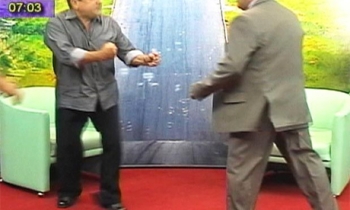The gruesome murder of the Ashanti Regional Chairman of the Ghana Journalists Association, Samuel Ennin last Friday in Kumasi has sent a wave of fear and panic among media practitioners in the Ashanti Regional capital.
Even though the security agencies are yet to make any arrests or establish the motive for the bizarre killing of the Ashanti Regional Chairman of the GJA, political reasons are not being ruled out. Ennin’s political leanings and submissions on matters of politics on radio are subjects of speculation about his murder.
This, among several other reasons has sent shivers of fear among media personnel who are also political commentators in Kumasi. Until his death, Mr Ennin was the host of "Point of Order,” a popular political programme, and was a panellist of the newspaper segment of the Morning Show on Ash FM, a local radio station in Kumasi.
He had also worked with the Free Press as its Ashanti Regional correspondent, and Shaft FM in Obuasi. The late Ennin was also in the process of establishing his own newspaper, The Star before his untimely death. His killing has provoked widespread condemnation, especially in Kumasi.
George Ayisi Boateng, a leading member of the New Patriotic Party and a former panellist on “Point of Order” described his killing as “senseless and tragic.”
“It is not only his family that has lost a relative and cherished family member but his death is a big blow to the nation as a whole,” he told The Statesman.
It will be recalled that unidentified gunmen on Friday night shot and killed the Ashanti Regional chairman of the GJA at a drinking spot at Pankrono Estate in Kumasi. The Ashanti Region heads of the police service, the Bureau of National Investigations and the Regional Security Co-ordinator visited the murder scene on Saturday to interview eye witnesses.
Government on Monday condemned Mr Ennin’s killing, describing it as a “dastardly and cowardly act.” While extending its condolences to the bereaved family, the Government statement, signed by Information Minister Kwamena Bartels, assured that the full apparatus of the security services had been put to work to unravel the mystery behind the murder.
“Government wishes to register its solidarity and support for journalists in the performance of their duties and hope that Mr Ennin’s murder, whatever the motives, will hamper their continued drive towards maturing our country’s democracy,” it added.
Meanwhile, the Ashanti Regional Police command has placed a ¢20 million bounty on the heads of Mr Ennin’s killers. Announcing this at a press conference yesterday, regional police commander Frank Adu Poku said his men were determined to find Mr Ennin’s killers as early as practicable, and called on the general public to volunteer any information that would lead to the speedy arrest of the culprits.
He warned radio presenters to stop interviewing witnesses and friends of the late Ennin on air since it may distort police investigations and endanger lives of compatriots of the deceased as the police is yet to establish the reason why he was killed.
The GJA has also offered a reward of ¢10 million to anyone or group of persons with information leading to the arrest of Mr Ennin’s killers.
A statement signed by GJA National President Ransford Tetteh appealed to members of the general public, “especially lovers of free expression and democracy to lend their support to the police in their search for the murderers.”
In a related development, Chris Asher, a veteran journalist and a publisher, has urged Government to seek the assistance of the International Police Organisation [Interpol] and the United Kingdom’s Scotland Yard in investigating Mr Ennin’s killing
This, however, should not be misconstrued to mean the country’s police service is inefficient, rather the foreign institutions with their facilities and expertise could help speed up the investigation process to unravel the circumstances surrounding the killing, he explained.
The veteran journalist, who spoke with The Statesman, argued that the nature of the killing creates the impression that the perpetrators had a motive other than robbery. But, this notwithstanding, if it is established that he was killed because he had stepped on the wrong toes in the discharge of his duties, then it would represent a clear and present danger to journalism in the country.
“It’s dangerous because if we are reduced to a state where media practitioners can not carry on their duty simply because somebody does not like what they are writing or airing, then God have mercy on us,” he stressed.









